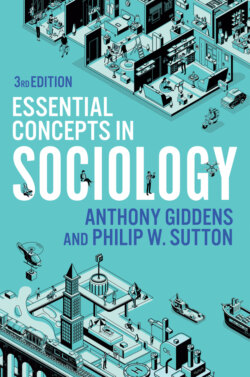Читать книгу Essential Concepts in Sociology - Anthony Giddens - Страница 74
Meaning and Interpretation
ОглавлениеArguably, the key issue for sociology since Auguste Comte’s positivism has been whether or not sociology is a science. How does the discipline relate to other acknowledged sciences such as astronomy, physics, chemistry and biology? And what is it that makes them so unproblematically ‘scientific’ anyway? Many people believe that scientific research involves the use of systematic methods, the gathering of empirical evidence, the analysis of data and the development of theoretical explanations for that data. Over time, the sciences can then build a significant body of reliable knowledge. If we accept this characterization, then sociology is a science, as it does involve systematic methods of empirical investigation, the analysis of data and the assessment of theories in the light of evidence and logical argument. However, a growing number of sociologists are uneasy about discussing their discipline as scientific and may be more comfortable seeing it as closer to the humanities than to the natural sciences.
Studying human beings is clearly different in some ways from observing events in the natural world, so maybe sociology and the natural sciences can never be identical. Human beings do not merely act on instinct or through some biological imperative but interact with each other in meaningful ways. This means that, in order to describe and explain social life, sociologists need to find ways of understanding why people act in the ways that they do. People generally behave according to intentions, and sociologists will often reconstruct the meanings individuals attached to their own actions. To grasp the behaviour of frogs involves no such reconstruction of complex mental reasoning. The meaningful nature of human action is both an advantage and a problem. Sociologists cannot simply adopt the methods of successful natural sciences such as biology or chemistry but must devise their own methods that are adequate for their specific subject matter – human beings and social life. One important advantage is that sociologists can speak directly with their research participants and understand the responses they get. This opportunity to converse with the participants of research studies and to confirm one’s interpretations means that sociological findings are, at least potentially, even more reliable (different researchers would arrive at the same results) and valid (the research actually measures what it is supposed to) than those from the natural sciences. Max Weber saw such gains as crucial to the scientific status of sociology. Even though its methods are necessarily different, they are no less systematic, rigorous and theoretically informed than those of any other science.
Yet sociologists face some problems that natural scientists do not. Self-aware individuals may subtly alter their usual behaviour when they know it is being studied, thereby invalidating the researcher’s findings. For instance, in daily life people constantly attempt to manage the presentation of their self to others, and this process of ‘impression management’ may occur during sociological research. Sociologists must be aware of the distinct possibility that, during interviews and questionnaires, respondents may offer the answers they believe the researchers are looking for. These various issues illustrate a key feature of studying human beings – the problem of reflexivity.
Sociological knowledge filters back into society and becomes part of the very same social context being studied, potentially altering that social context. Social reflexivity has no counterpart in the natural sciences, which means that, if it is a science, sociology cannot simply adopt the same methods as natural science but must develop its own ‘object-adequate’ methods.
